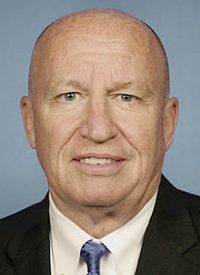
As scrutiny of the Federal Reserve System and public outrage over its actions continue to build, lawmakers on both sides of the aisle are working on proposals that would supposedly rein in the Fed or at least change the way it operates. And a new measure aims to tackle some of the issues head on.
Joint Economic Committee Vice Chairman Rep. Kevin Brady (R-Texas, left) is preparing to introduce the latest effort to alter the nation’s monetary system in Congress later this week. Known as the “Sound Dollar Act,” the legislation would impose some major reforms on the way America’s powerful central bank does business.
“If we want America to remain the strongest economy in the world, the Fed needs a clear, proven direction from Congress,” Rep. Brady said. “A sound dollar creates certainty for the free market, protects against inflation and deflation and is the one factor that monetary policy truly impacts over the long term.”
During the financial crisis, the Fed took a range of highly controversial actions including purchasing trillions of dollars in assets and well over $1 trillion of mortgage-backed securities, manipulating markets, bailing out foreign banks, and much more. Rep. Brady’s bill would seek to address a few of the policies and actions that caused the greatest uproar over the last few years.
The wild spending spree by the Fed saw trillions of newly created dollars used to bail out mega-banks and financial institutions all around the world without any oversight. And experts have been sounding the alarm about the controversial measures for years, warning that all the new currency would eventually result in serious price inflation — possibly even hyperinflation.
But according to some analysts and experts on the monetary system, the changes proposed under Brady’s bill would hardly fix the underlying problems. In fact, the real causes of the crises are inherent in the current debt-based monetary system. Simple reforms and minor tinkering will not be enough.
One the most significant measures outlined in the bill would be a change in the Fed’s mission. Its current so-called “dual mandate” — maintaining stable prices and maximum employment — would be altered to simply focus the central bank on keeping “inflation” in check, supposedly using a “rules-based” regime rather than subjective decisions.
To keep the value of the dollar stable and prevent more bubbles, the Fed would be expected to monitor prices of a broad range of assets including gold, bonds, equities, commodities, and real estate. It would also have to publicly explain to Congress the impact of its decisions on the dollar’s value.
However, because virtually every Federal Reserve Note dollar enters the economy as debt with interest attached — through, for instance, Fed purchases of interest-bearing government bonds that must be repaid by taxpayers — there will always be more debt than currency. So, if the Fed were to completely stop inflating the supply of currency, an extraordinarily harmful form of deflation along the lines of the Great Depression would ravage the economy until there was not a single Federal Reserve Note in circulation. Massive, unpayable debts, however, would still exist.
Therefore, by its very nature, the Fed must continue to create ever-greater amounts of debt currency. If it stopped, the economy would grind to a halt as a wave of defaults swept across the nation. To solve the problem of inflation — a phenomenon that benefits the well-connected at the top while decimating the poor and middle class — a radical redesign of the whole monetary system including a currency not based on debt would be needed.
Another one of the most important changes in Brady’s legislation would limit the Fed’s Open Market Operations primarily to purchases of U.S. government securities. According to the bill, the change would help to ensure neutrality in credit allocation among households, companies, and economic sectors rather than allowing the Fed to pick winners and losers.
In emergencies, however, the restrictions would not apply. If Fed bosses decided it was necessary, the central bank could once again gobble up a broad range of assets — though, under the legislation, policy makers would be required to explain the decisions to Congress and get rid of all such assets within five years.
Under the bill, the Federal Open Market Committee — a 12-member board that sets monetary policies including key interest rates — would also be reconfigured. If passed into law, the FOMC would be expanded to 19 members including a representative of all 12 regional Fed banks as well as the seven Washington, D.C.-based governors “appointed” by the President.
Regional Fed banks, it should be noted, are private institutions owned and largely controlled by shareholders — primarily member banks. That is why analysts often refer to the nation’s central bank as a banking “cartel” with monopoly power over the currency.
“The chairman would obviously have to do a lot more work to persuade a broader group of people,” Brady was quoted as saying about the expansion of the policy-making body. “Bringing in regional bank presidents would break the Washington-to-New York axis.”
In an effort to increase market efficiency and transparency, the legislation would force the Fed to release transcripts of its policy-making meetings to the public within three years. The central bank would also have to clearly explain its “lender of last resort” policy to address the “too big to fail” mentality among bankers and politicians.
The bill addresses areas that are not directly linked to monetary policy, too. It would, for example, bring Obama’s cherished “Bureau of Consumer Financial Protection” and its budget under the purview of the government instead of the Fed.
And, “to prevent further abuses” by Treasury Secretaries, the bill would require the liquidation of any holdings in the “Exchange Stabilization Fund,” which Brady called a “slush fund,” with the exception of Special Drawing Rights (SDRs) issued by the International Monetary Fund (IMF). The proceeds from the sale of those assets would then be used to reduce the public debt.
While some analysts have praised Brady’s effort and its potential to spark a much-needed debate on the central bank, the bill is still unlikely to pass. Even if it made it through the House and Senate, President Obama would probably veto it. Plus, Fed boss Ben Bernanke recently stated that he would not be running the central bank much differently under a single mandate anyway.
But lawmakers on the other side of the aisle have their own ideas about how to reform the Fed. Rep. Barney Frank (D-Mass.), for example, who is the top Democrat on the House Financial Services Committee, introduced a bill last year to remove the banker-appointed regional Fed chiefs from the FOMC entirely.
Then there is GOP presidential candidate Rep. Ron Paul (R-Texas), the chairman of the House subcommittee in charge of monetary policy. An ardent supporter of honest money, Rep. Paul has been hammering on the Fed for decades. And his efforts have finally started to pay off as the role of the Fed and its policies become a serious political issue being debated all across the nation.
Paul argues that alternative currencies selected by the market — gold and silver, perhaps — should be legalized in commerce by repealing legal tender laws. That would likely lead to abolishing the Fed — a long-held goal of Paul and his legions of supporters — as its debt-based currency eventually imploded.
First, however, Paul, the vast majority of the public, and even lawmakers on both sides of the aisle hope to find out what is going on behind the scenes. A limited audit of the Fed was already conducted as a watered-down version of Paul’s popular legislation finally became law. But there is a long way to go before complete disclosure is achieved in spite of Fed lobbying.
“Transparency and a full audit of the Federal Reserve is a start and something we must continue to pursue,” Paul observed in a recent statement. “And, if those in power don’t have the stomach to bring the Fed out into full daylight, the American people deserve at least the right to conduct their economic transactions in the medium of exchange of their choosing.”
The Texas Congressman also announced subcommittee hearings later this year to explore restoring sound money in America. “Our fiat system helped create the massive debt crisis we find ourselves in, and has eroded the purchasing power of every American,” Paul said in a statement announcing the hearings. “The American people deserve to have a choice of currencies to protect themselves and their families from the poor decisions of government.”
Related articles:
Fed Manipulations in the Crosshairs
U.S. Fed Bailout of Euro Prompts New Push for Audit & Sound Money
Fed Audit: Trillions for Foreign Banks, Conflicts of Interest



